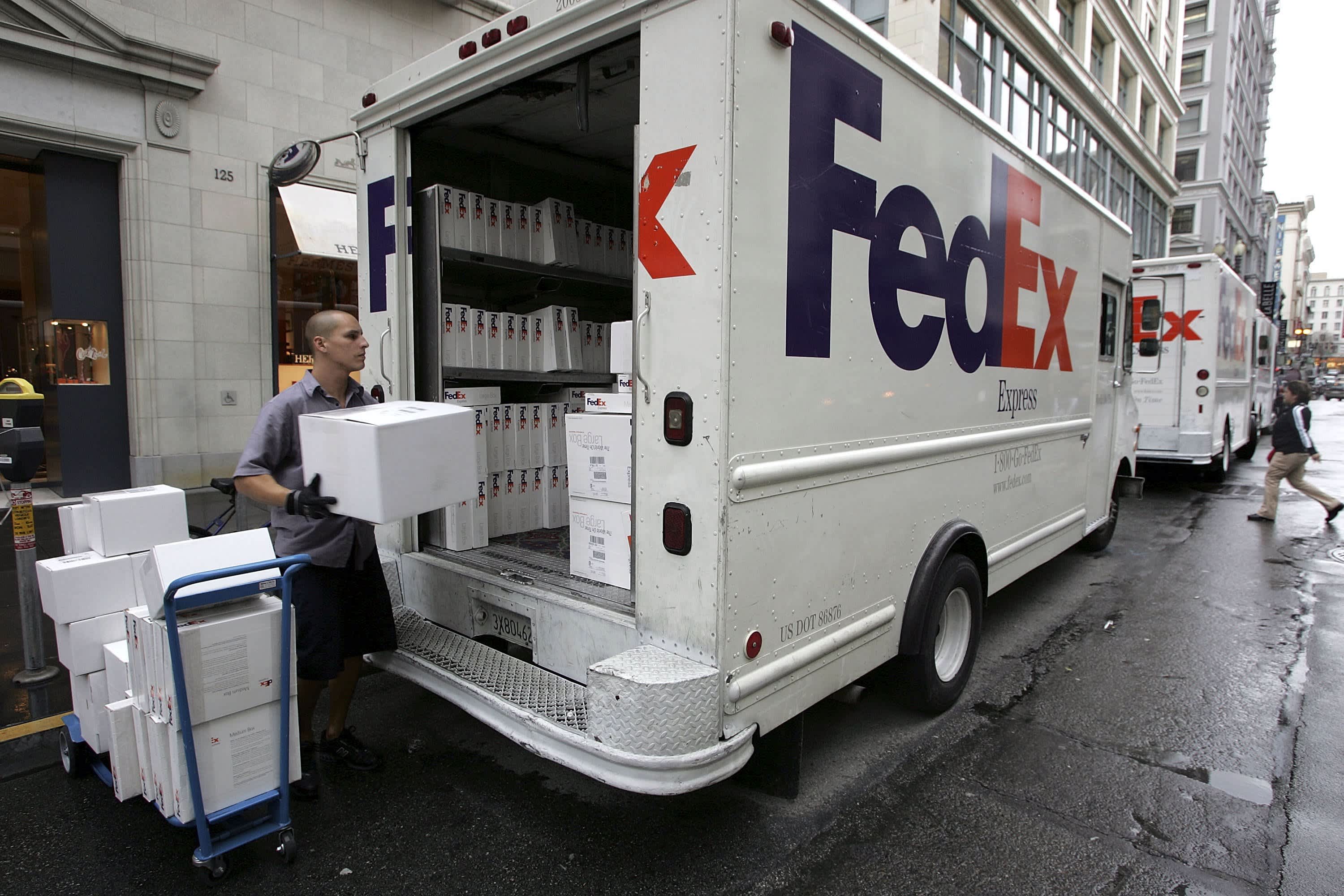A FedEx employee loads up deliveries in San Francisco.
Getty Images
A progressive group pushing Congress to raise the corporate tax rate is launching an ad campaign targeting FedEx and Nike, two large American companies with light federal tax bills, the group said Monday.
Tax March, which held dozens of demonstrations in 2017 calling on former President Donald Trump to release his tax returns, plans to release ads targeting FedEx on Tuesday. The TV ads will air in Washington, D.C., and in Memphis, Tennessee, where FedEx is headquartered.
A report by the Institute on Taxation and Economic Policy says FedEx “zeroed out its federal income tax on $1.2 billion of U.S. pretax income in 2020 and received a rebate of $230 million.” The report says the lack of payments in taxes by some corporations is likely linked to historic tax breaks as well as Trump’s 2017 tax reform plan and certain elements of the coronavirus relief bill known as the CARES Act.
Tax March also plans to target Nike with a newspaper ad next week in the shoe giant’s home state of Oregon, according to Dana Bye, the campaign director for the group. She said the newspaper ad will have a message similar to that of the TV spot focusing on FedEx.
The institute’s report said Nike “didn’t pay a dime of federal income tax on almost $2.9 billion of U.S. pretax income last year, instead enjoying a $109 million tax rebate.”
“FedEx pays all U.S. federal, state, and local taxes, totaling over $20 billion between 2016 and 2020. During that time Congress adopted new tax laws to help companies like FedEx make additional investments in its people, providing pay increases and funding pensions, and in local economies, adding new jobs and improving infrastructure. These changes were laws, not loopholes,” company spokeswoman Isabel Rollison said in a statement after this story was published.
After issuing her initial statement, Rollison later clarified to CNBC saying “FedEx pays all U.S. federal, state, and local taxes, totaling over $9 billion between 2016 and 2020.”
“FedEx has collected and remitted over $20 billion in taxes in the U.S. (federal, state and local individual income, payroll, customs duties and state & local sales tax) during the last five fiscal years 2016-2020,”she added.
A representatives for Nike didn’t respond to CNBC’s request for comment.
President Joe Biden has said he wants to raise the corporate tax rate to 28% to help pay for his $2 trillion infrastructure reform package. He has since said that he’s willing to negotiate on the potential corporate tax hike as moderate Democrats such as Sen. Joe Manchin, D-W.Va., have pushed back on raising the rate to 28%.
Bye said the campaign as a whole will cost almost $500,000. It will also include digital ads on Facebook and other platforms.
The TV ad, first reviewed by CNBC, takes aim at FedEx as one of several companies that paid little to no federal corporate income taxes recently.
“Tell Congress: It’s time to put the people first,” a voiceover on the FedEx ad says. “Make corporations like FedEx pay their fair share.”
FedEx recently told CNBC that it is against raising corporate taxes as way to pay for Biden’s infrastructure plan. Advocacy groups such as the Chamber of Commerce and the Business Roundtable have also opposed the idea of raising the corporate tax rate as a way to pay for infrastructure.
“I think the biggest statement we are trying to make through this campaign is that we can’t let corporate tax dodgers like FedEx drive the debate on taxes,” Bye said.
Tax March is a project of the Sixteen Thirty Fund, a dark money 501(c)(4) organization that contributed just over $60 million to Democratic-aligned groups during the 2020 election, including millions to super PACs backing Biden, according to data from the nonpartisan Center for Responsive Politics.
The campaign by Tax March is one of the first to take on corporations since Biden became president. It comes as corporations are under pressure to respond to new voting laws such as those recently passed in Georgia.

